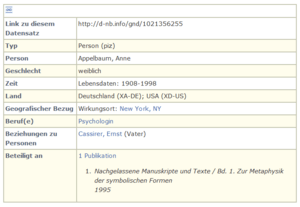Integrated Authority File facts for kids
The Integrated Authority File (which in German is called Gemeinsame Normdatei), or GND for short, is like a super important list used around the world. Imagine it as a special system that helps librarians, archivists, and museum staff keep track of information.
It helps them organize things like people's names, topics, and names of organizations. This makes it much easier to find books, documents, and other items. The GND is managed by the German National Library and other partners. It's also available for anyone to use freely, thanks to the Creative Commons Zero (CC0) license.
What Came Before GND
The Integrated Authority File (GND) started working in April 2012. Before GND, there were several separate lists that did similar jobs. The GND brought all of these older lists together into one big, organized system.
These older lists, which are now part of GND, included:
- The Name Authority File (Personennamendatei in German), which was for people's names.
- The Corporate Bodies Authority File (Gemeinsame Körperschaftsdatei), which was for names of groups or organizations.
- The Subject Headings Authority File (Schlagwortnormdatei), which helped organize topics.
- The Uniform Title File of the German Music Archive (Einheitssachtitel-Datei des Deutschen Musikarchivs), which was for music titles.
When the GND first launched in 2012, it already had a massive amount of information. It contained nearly 9.5 million records! About 2.65 million of these records were for individual people's names.
See also
 In Spanish: Gemeinsame Normdatei para niños
In Spanish: Gemeinsame Normdatei para niños
 | Delilah Pierce |
 | Gordon Parks |
 | Augusta Savage |
 | Charles Ethan Porter |


